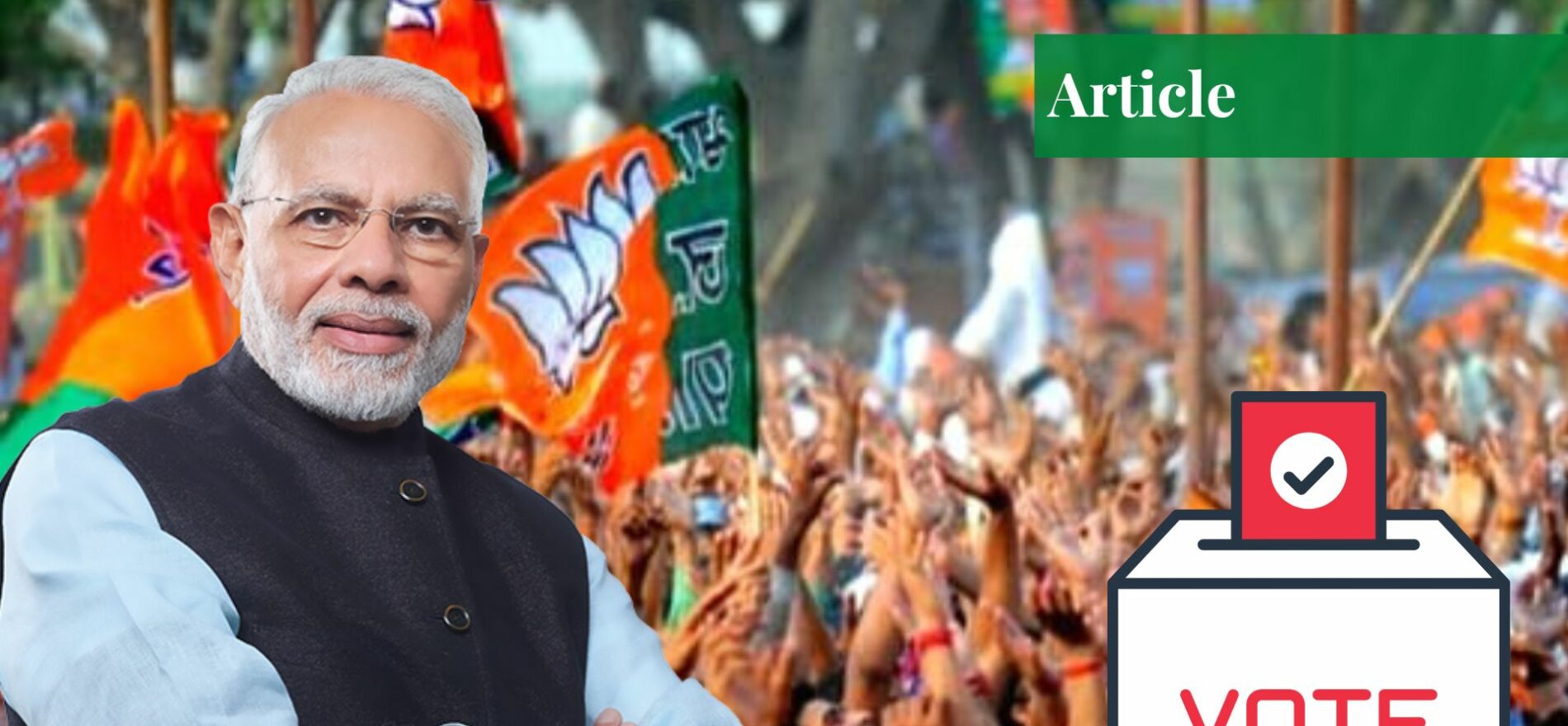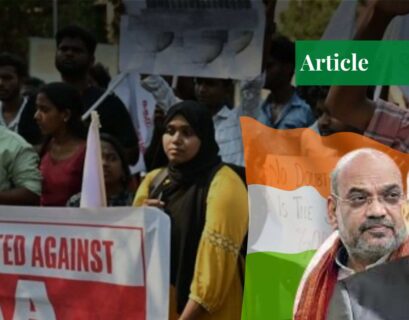She has a Bachelor's degree in Economics and Politics from the LUMS. She has previously worked at the Research and Development Foundation (RDF) as a research associate.
The Electoral Cycle
India is considered the largest democracy in the world. With 968 million people eligible to vote and 500 million expected to vote, the 18th upcoming 2024 Lok Sabha elections are hailed as the largest electoral exercise in the world. The elections will be held in India, in seven phases from 19 April 2024 to 1 June 2024.
Although the results will be announced on 4th June, the outcome is widely known because of the 2024 Lok Sabha polls, approval ratings, and the spate of undemocratic steps taken to curb dissent and opposition. The incumbent Bharatiya Janata Party (BJP) and Prime Minister Narendra Modi are expected to return to power for a third consecutive term.
Given the record of majoritarianism and authoritarianism undertaken by Modi’s previous tenures (2014-2019 and 2019-2024), a third tenure does not bode well for democracy, secularism, and the protection of minorities within India. The return also raises concerns for the wider region due to the party’s hegemonic aspirations.
Bhartiya Janata Party (BJP)
The BJP was formed in 1980 as the political wing of the Rashtriya Swayamsevak Sangh (RSS), which was organized in 1925 on the ideology of Hindutva. Although the BJP came into power in 1998 with Prime Minister Atal Bihari Vajpayee, it maintained a moderate attitude while working with other coalition partners in the government.
The electoral cycles of 2014 and 2019 gave the party a majority government, increasing its space to implement policies of the Hindutva ideology. Holding 346 out of 543 Lok Sabha seats, the BJP, in its second term (2019-2024), has doubled down on its harsh and absolutist policies. For its expected third term, the BJP will secure an even larger majority with little opposition in the parliament, providing a free pathway to enforce stronger measures.
Recession of Secularism and Democracy in India (2014-2024)
Hate Crimes Against Minorities
To begin with, the rights of minorities are threatened. International forums have reported extensively on violence and hate crimes against minorities which include targeted attacks on the homes and communities. Muslims are prevented from purchasing or renting property in Hindu-majority areas; voices raised against these atrocities are silenced.
Many human rights advocates and journalists speaking up about such issues have been intimidated and harassed. Countless instances of enforced disappearances have also been reported. These trends are worrying as minorities constitute 20% of the population. The large population of India means that the ongoing marginalization and discrimination affect the lives of more than 200 million people.
Ram Mandir
The construction and consecration of Ram Mandir on the ruins of the Babri Mosque have tainted the image of secularism in India. Ram Temple was constructed on the site of Babri Mosque in Ayodhya. The centuries-old Mosque was demolished by an extremist mob in 1992.
The Indian judiciary acquitted the extremists and cleared the way for the mandir’s construction. The protection of minorities, their places of worship, and their right to freely practice their religion have been threatened amidst the growing majoritarianism in India.
Citizenship Amendment Act (CAA)
The Citizenship Amendment Act (CAA) 2019 was passed as a discriminatory legislation. It facilitates citizenship for some migrants and deportation for others based on their religion. This was operationalized in March 2024 and is set to be weaponized against Muslims. The 1955 Citizenship Act previously prohibited all undocumented migrants from acquiring Indian citizenship. The CAA puts discriminatory qualifications for citizenship in India based on religion. This is inconsistent with international standards and covenants signed by India.
Democracy in India has receded through systematic centralization of power in the executive, curbing of opposition, and reversal of checks on the power of the government.
Dissent is quickly branded as treason. As a result, opposition leaders are being jailed on charges of graft. For example, Arvind Kejriwal, the sitting Chief Minister of Delhi, was arrested on corruption charges. This is in addition to the majority of cases opened by the Enforcement Directorate—a body made to investigate financial crimes that has now become a tool used by the incumbent government to launch witch hunts against its opposition.
Legislative Scrutiny
The checks on the sitting government have also been reduced. Scrutiny on legislation passed by the BJP Government is limited. Parliamentary committees have not played their part in legislative scrutiny. For example, committees debated 71% of the bills passed by the parliament from 2009-2014. For the parliament under the BJP Government from 2014 to 2019, this oversight by parliamentary committees was reduced to 25%. Since 2019, this has further reduced to 13%. This has reduced space for legislative scrutiny.
Analysts have estimated an increase in the number of seats for BJP in the Lok Sabha (lower house) and Rajya Sabha (upper house) for the predicted third term of the party. A dominating position of one party in the parliament will further reduce space for dissent, debate, legislative scrutiny, and oversight. This directly threatens the multi-party system, the backbone of a democracy.
Judiciary
The independence of the judiciary has also been curtailed, reducing assessments of the government. There are signs of judicial restraint leading to dormancy on pressing issues. Judicial decisions also reflect political motivations. Political interference in the distribution of cases remains a worrying trend affecting the impartiality of judges.
The Supreme Court of India recently validated the unilateral action that revoked the special status of Indian-occupied Jammu and Kashmir (IOJK). This is a travesty of their legal and constitutional principles and a violation of international law. The spate of decisions on the Ayodhya temple, electoral bonds, and the Prevention of Money Laundering Act is evidence of tainted judicial independence.
Media
Media, an important check on the government, is also far from independent. Media channels are controlled through selective licensing, harassment, enforced disappearances of journalists, and the direct buying of media houses. Journalistic reports published by international media houses that are critical of the Indian Government are banned in the country. A BBC report critical of Modi’s policies was banned in India in 2023. Such reports are branded as external propaganda to thwart India’s rise to global prominence.
Media houses under the influence of the government continue to popularize Modi and his government. Take the example of the G-20 summit. It was held in India in 2023 under a regular system of rotating presidency of the forum. However, the media hailed it as Modi’s diplomatic achievement to hoist India on global leadership. Even eight months after the summit, propaganda posters can be found in New Delhi adding to its popularity.
The Modi regime has popularized the claim that it led India’s economy to be the fastest-growing economy in the world. Indeed, India witnessed the fastest growth globally in the last quarter of 2023. However, this growth is part of the economy’s recovery after the biggest recession during the COVID-19 pandemic. Therefore, the growth rate results from a recovery from the slump, not as a result of Modi’s policies as the government has portrayed.
Similarly, this growth is highly unequal. Inequality in India is at a 100-year high, with the top 1% owning more than 40% of the wealth. In addition to massive inequalities, the growth is not producing enough jobs for its youth. This side of the picture is hidden in the media campaigns.
Implications for the Region
Apart from the implications within India, Modi’s return is cause for concern for the security of the wider region.
The special status of IOJK was unilaterally reversed on 5 August 2019. This action directly violates international law and numerous UN resolutions. Human rights violations in IOJK continue unabated. Additionally, political parties have been outlawed to repress the voices of the Kashmiri people. This hostile environment will continue to block prospects of peace and dialogue between Pakistan and India.
The recent Indian Supreme Court judgment validating the revocation of special status is also against international norms and is highly condemned. The resolution of the dispute ultimately lies in giving the right to self-determination to the Kashmiri people.
An expected third term of BJP will continue to make the geopolitical calculus difficult to navigate. Election campaigns, filled with jingoistic, hegemonic, and militaristic narratives, will only serve to increase hostility and distrust in the region.
Additionally, hegemonic designs from their end block prospects of greater regional economic activity. Intra-region trade in South Asia is as low as 5%. South Asian Association for Regional Cooperation (SAARC) continues to be ineffective as India refuses to work with other countries in the region on an equal footing. This attitude towards other countries in the region prevents wider engagement for trade, poverty alleviation, and climate adaptation.
Conclusion
The internal dynamics of India, with a reversal of secularism and democracy, are worrisome. Its effects are a cause of concern for the minorities within India and the Kashmiri people. The security of the wider region is on the edge of a precipice as well.
Minorities in India continue to suffer, adding to Islamophobia and anti-Pakistan rhetoric. The hatred spewed by the Modi administration makes the region volatile; and filled with hatred and distrust. The 2024 Lok Sabha elections in India, set to bring Modi back to power for a third consecutive term, are therefore worrisome.
The West continues to turn a blind eye to this because of India’s economic might. It is also considered a counterweight to China amid the rising competition between the United States of America and China. However, the West must not compromise on its wider ideals of democracy, pluralism, human rights, and the rights of minorities for material benefits. The lives of 200 million people of minority groups within India are at stake. The lives of 1.92 billion people in the South Asian region are also concerned in this hostile and non-cooperative environment.
If you want to submit your articles and/or research papers, please check the Submissions page.
The views and opinions expressed in this article/paper are the author’s own and do not necessarily reflect the editorial position of Paradigm Shift.



















